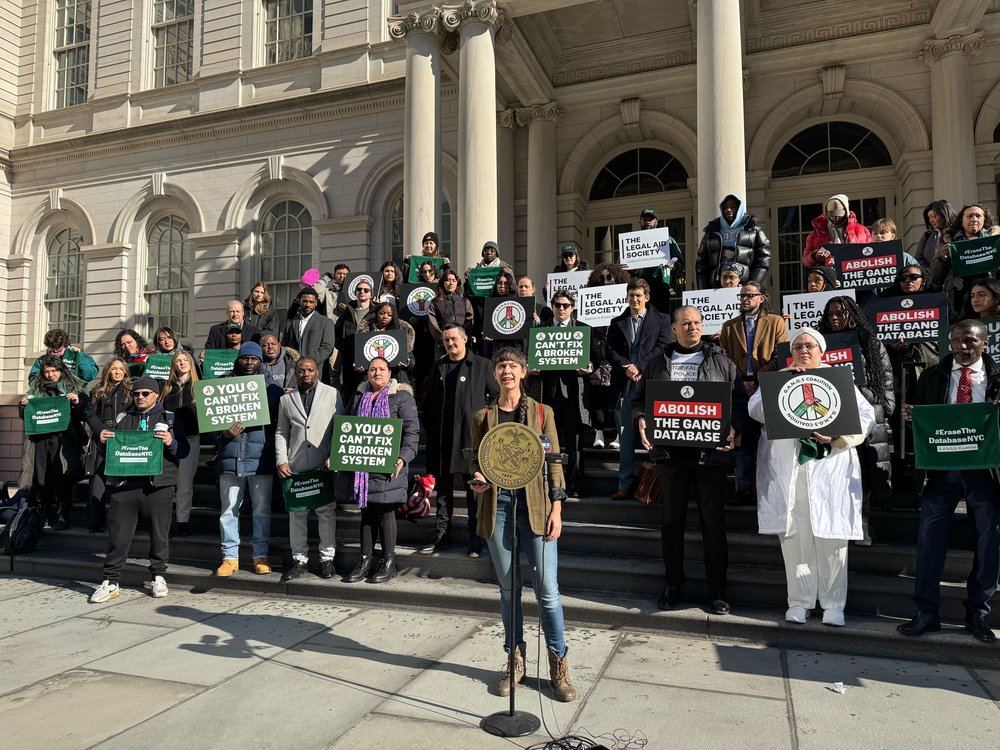NYPD and NYC councilmembers face off over tracker of alleged gang members
Feb. 24, 2025, 8:58 a.m.
A pending bill would ban the department's gang database entirely, while another would restrict police’s ability to collect DNA from minors who have not been arrested.

New York City councilmembers sparred with police officials on Monday over a pair of bills that would abolish the NYPD’s gang tracker and prohibit the department from collecting DNA from minors who have not been arrested.
The first bill would eliminate the NYPD’s “Criminal Groups Database,” which contains information on thousands of alleged gang members, and prevent any similar tracker from succeeding it. The legislation was initially sponsored by 24 councilmembers, just two short of the majority needed for it to pass.
Under the bill, law enforcement officials would no longer be able to access the data in the tracker and would have to notify anyone named in it so they could request police records about themselves. The NYPD’s inspector general would be responsible for enforcing any violations of the law, which would include civil penalties and allow for people “aggrieved by a violation” to sue the city for damages.
An hourslong City Council hearing Monday featured tense exchanges between some lawmakers and police leaders, with each side repeatedly talking over the other about whether the tracker was racially biased or a useful public safety tool.
Police said they used it to monitor trends and other intelligence on gangs — including group names, incidents, locations and rivalries — and deploy resources to fight crime.
“This information helps the department interrupt cycles of violence and prevent acts of violent retaliation,” testified Michael Gerber, the NYPD’s deputy commissioner of legal matters. He said there were currently more than 13,000 people in the database.
But Althea Stevens, a Bronx councilmember who authored the bill, said the tracker represented a form of “racial profiling,” as police confirmed the overwhelming majority of those listed in it were people of color. She argued that NYPD officials had other public safety tools at their disposal and questioned the evidence the department cited for the tracker’s success.
“You guys are willing to go so hard around something that I do not feel like is moving the needle,” Stevens said, calling instead for more funding for community-based organizations to address the root causes of crime.
Progressives have long criticized the gang database, saying it unfairly targets people of color for reasons unrelated to public safety, like the music people listen to and their social acquaintances. They have also said it is not transparent and weakens due process.
Conservatives and law enforcement officials have said the gang database is an important way for police to monitor potential criminal activity, arguing that abolishing or overly restricting it would undermine public safety.

Inside the City Council chambers on Monday, NYPD officials emphasized the tracker’s role in “precision policing,” which they said has reduced violent crime, especially in precincts with patterns of shootings and other incidents.
The officials also said more people have been removed from the database in recent years than have been added. According to Gerber, about 700 people were added over the last two years, while 3,200 were removed.
While some councilmembers, including Republicans Vickie Paladino and Joann Ariola of Queens, praised the NYPD’s use of the tracker, others like Yusef Salaam, who cosponsored Stevens’ bill and chairs the City Council’s public safety committee, said much of what police officials testified during the hearing was “concerning.”
Councilmember Keith Powers of Manhattan voiced opposition to the bill, tweeting, “We should be ensuring that law enforcement has the tools to conduct investigations and solve crime, rather than handcuffing them.”
Proponents of the measure rallied on the steps of City Hall prior to the hearing. They included members of the GANGS Coalition, an advocacy group composed of civil rights organizations and residents.
The second bill discussed Monday would require police to obtain consent from parents, lawyers or legal guardians to collect DNA samples from minors who have not been arrested. The rule would not apply to items left behind at crime scenes or to DNA collected from victims of crime, according to the legislation, which was sponsored by Councilmember Diana Ayala and seven others.
The NYPD’s Gerber asked for the bill to be amended to include a “narrow carveout” where police could get special authorization from the chief of detectives to collect DNA from unarrested teens in cases of serious crimes, like murder, rape, and kidnapping.
“There would be a universe of felonies where we would otherwise potentially be seeking to take DNA, and we won’t be able to anymore,” he said.
In order to pass, each of the bills needs the support of at least 26 councilmembers.
This story has been updated with additional information.
NYPD says plan to monitor 14th Amendment stop-and-frisk violations is finally 'a priority' 30 alleged gang members accused of half of 2024's shootings in Inwood and Washington Heights